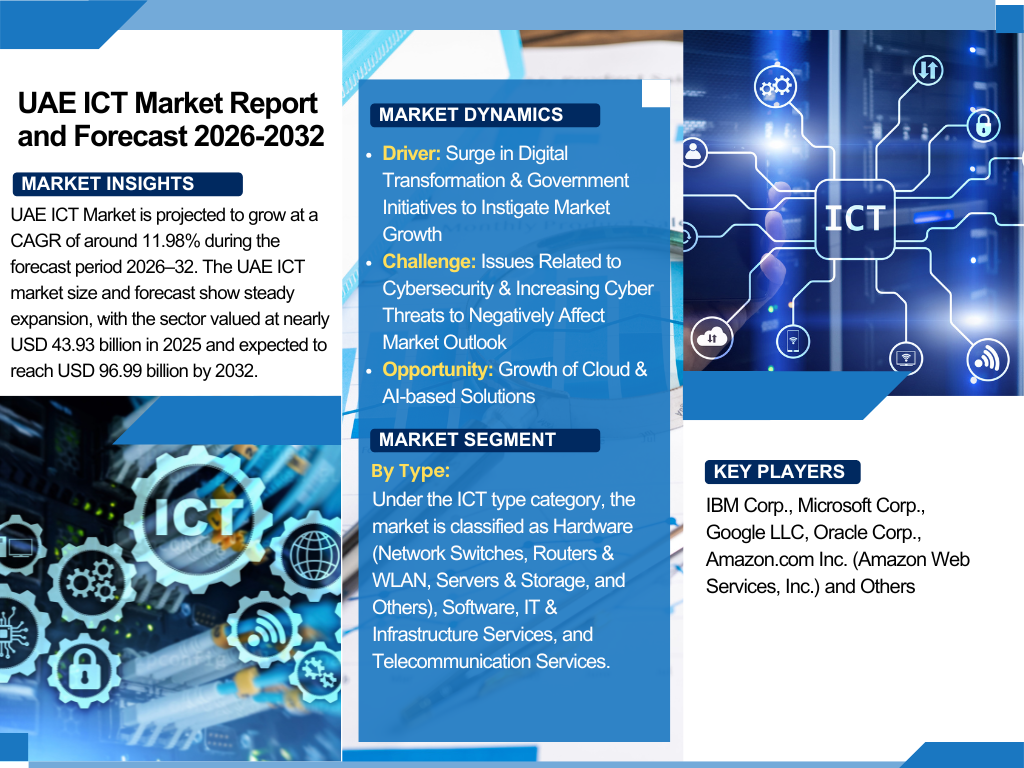The United Arab Emirates is positioning itself as the Middle East's digital powerhouse, with its Information and Communication Technology (ICT) sector experiencing unprecedented expansion. Recent market analysis reveals a compelling growth trajectory that underscores the nation's commitment to becoming a global technology hub.
Market Growth Trajectory
The UAE ICT market presents an impressive financial landscape, valued at approximately $43.93 billion in 2025 and projected to reach $96.99 billion by 2032. This remarkable growth represents a compound annual growth rate (CAGR) of 11.98%, significantly outpacing many global markets. The robust expansion reflects the country's strategic pivot toward a diversified, technology-driven economy less dependent on traditional oil revenues.
Several key factors are driving this exceptional growth. The rapid adoption of cloud computing technologies, substantial investments in artificial intelligence infrastructure, and increasing demand for advanced telecommunication services across the Emirates are creating a perfect storm of opportunity. Government initiatives, including the UAE's National AI Strategy and ambitious smart city projects in Dubai and Abu Dhabi, are providing the foundational framework for sustained expansion.
Government as the Catalyst
The UAE government emerges as the primary catalyst behind this digital transformation. Through initiatives like Dubai's 10X program and AI-powered government services, public sector leadership is reshaping both governmental operations and private sector adoption patterns. The introduction of golden visas for ICT professionals in 2024 has attracted global talent, enhancing the country's competitive edge in technology innovation.
Large-scale funding announcements for digital transformation programs across banking, e-commerce, and education sectors demonstrate the government's unwavering commitment. This public sector leadership creates a ripple effect, encouraging private enterprises to accelerate their own digital adoption strategies.
Market Segmentation and Leadership
Within the ICT ecosystem, telecommunication services dominate the landscape, capturing the largest market share. This leadership position stems from massive government investments in 5G infrastructure and fiber connectivity, combined with the UAE's exceptional smartphone penetration rates and growing demand for digital communication solutions.
The government sector itself represents the most prominent distribution channel, leading ICT adoption across the nation. From Abu Dhabi's Smart Government vision to Dubai's transformative urban initiatives, public sector demand is setting benchmarks that influence healthcare, banking, financial services, and retail sectors.
Global Tech Giants Embrace the UAE
International technology leaders are recognizing the UAE's potential, with major expansions planned throughout the region. Microsoft Corporation and Amazon Web Services have extended their cloud infrastructure across the Emirates, ensuring data sovereignty while boosting enterprise adoption of digital platforms. These developments address critical concerns about data residency while providing scalable solutions for local businesses.
Cisco Systems has partnered with UAE telecom operators to advance next-generation communication technologies, while Google Cloud and other hyperscale companies are establishing localized data centers. These partnerships represent more than simple market expansion; they signify confidence in the UAE's long-term digital strategy and regulatory environment.
Navigating Challenges and Opportunities
Despite the optimistic outlook, the ICT market faces significant cybersecurity challenges. The acceleration of cloud adoption and data migration has created heightened security vulnerabilities across financial, e-commerce, and government platforms. The expansion of 5G networks, while offering tremendous opportunities, also broadens potential attack surfaces requiring substantial investments in advanced cyber defense capabilities.
However, these challenges present opportunities for growth in cybersecurity solutions and services. According to Cybersecurity Ventures, global cybersecurity spending is expected to exceed $1.75 trillion cumulatively over the next five years, with the Middle East representing one of the fastest-growing regions. The UAE's proactive regulatory approach and commitment to data privacy create a framework for sustainable development while maintaining security standards.
Innovation Through Smart City Integration
The UAE continues leading smart city technology integration, with autonomous vehicles, IoT-enabled infrastructure, and AI-driven public services defining the future landscape. Dubai's autonomous transportation strategy and AI-powered traffic management systems exemplify the increasing role of ICT in building sustainable, technology-first urban environments.
These initiatives position the UAE as a global benchmark for digital transformation, attracting international attention and investment while demonstrating practical applications of emerging technologies.
Future Outlook and Regional Impact
Looking toward 2032, the UAE ICT market is poised to become a global benchmark for digital innovation. The convergence of artificial intelligence, cloud computing, and next-generation communication technologies will solidify the country's position at the forefront of the Middle East digital economy.
The sustained growth trajectory, supported by government initiatives, increasing internet penetration, and enterprise investments in cybersecurity, cloud, and AI solutions, ensures the UAE's continued relevance in the global technology landscape. This transformation extends beyond economic benefits, establishing the Emirates as a regional hub that influences digital adoption patterns throughout the Middle East.
As the UAE continues its digital evolution, the ICT sector remains central to the nation's vision of a diversified, innovation-driven economy that serves as a model for technological advancement in the region.

